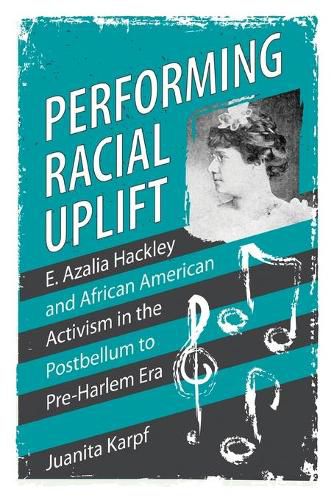Readings Newsletter
Become a Readings Member to make your shopping experience even easier.
Sign in or sign up for free!
You’re not far away from qualifying for FREE standard shipping within Australia
You’ve qualified for FREE standard shipping within Australia
The cart is loading…






This title is printed to order. This book may have been self-published. If so, we cannot guarantee the quality of the content. In the main most books will have gone through the editing process however some may not. We therefore suggest that you be aware of this before ordering this book. If in doubt check either the author or publisher’s details as we are unable to accept any returns unless they are faulty. Please contact us if you have any questions.
In Performing Racial Uplift: E. Azalia Hackley and African American Activism in the Postbellum to Pre-Harlem Era, Juanita Karpf rediscovers the career of Black activist E. Azalia Hackley (1867-1922), a concert artist, nationally famous music teacher, and charismatic lecturer. Growing up in Black Detroit, she began touring as a pianist and soprano soloist while only in her teens. By the late 1910s, she had toured coast-to-coast, earning glowing reviews. Her concert repertoire consisted of an innovative blend of spirituals, popular ballads, virtuosic showstoppers, and classical pieces. She also taught music while on tour and visited several hundred Black schools, churches, and communities during her career. She traveled overseas and, in London and Paris, studied singing with William Shakespeare and Jean de Reszke-two of the classical music world’s most renowned teachers.
Her acceptance into these famous studios confirmed her extraordinary musicianship, a first for an African American singer. She founded the Normal Vocal Institute in Chicago, the first music school founded by a Black performer to offer teacher training to aspiring African American musicians.
Hackley’s activist philosophy was unique. Unlike most activists of her era, she did not align herself unequivocally with either Booker T. Washington or W. E. B. Du Bois. Instead, she created her own mediatory philosophical approach. To carry out her agenda, she harnessed such strategies as giving music lessons to large audiences and delivering lectures on the ecumenical religious movement known as New Thought. In this book, Karpf reclaims Hackley’s legacy and details the talent, energy, determination, and unprecedented worldview she brought to the cause of racial uplift.
$9.00 standard shipping within Australia
FREE standard shipping within Australia for orders over $100.00
Express & International shipping calculated at checkout
This title is printed to order. This book may have been self-published. If so, we cannot guarantee the quality of the content. In the main most books will have gone through the editing process however some may not. We therefore suggest that you be aware of this before ordering this book. If in doubt check either the author or publisher’s details as we are unable to accept any returns unless they are faulty. Please contact us if you have any questions.
In Performing Racial Uplift: E. Azalia Hackley and African American Activism in the Postbellum to Pre-Harlem Era, Juanita Karpf rediscovers the career of Black activist E. Azalia Hackley (1867-1922), a concert artist, nationally famous music teacher, and charismatic lecturer. Growing up in Black Detroit, she began touring as a pianist and soprano soloist while only in her teens. By the late 1910s, she had toured coast-to-coast, earning glowing reviews. Her concert repertoire consisted of an innovative blend of spirituals, popular ballads, virtuosic showstoppers, and classical pieces. She also taught music while on tour and visited several hundred Black schools, churches, and communities during her career. She traveled overseas and, in London and Paris, studied singing with William Shakespeare and Jean de Reszke-two of the classical music world’s most renowned teachers.
Her acceptance into these famous studios confirmed her extraordinary musicianship, a first for an African American singer. She founded the Normal Vocal Institute in Chicago, the first music school founded by a Black performer to offer teacher training to aspiring African American musicians.
Hackley’s activist philosophy was unique. Unlike most activists of her era, she did not align herself unequivocally with either Booker T. Washington or W. E. B. Du Bois. Instead, she created her own mediatory philosophical approach. To carry out her agenda, she harnessed such strategies as giving music lessons to large audiences and delivering lectures on the ecumenical religious movement known as New Thought. In this book, Karpf reclaims Hackley’s legacy and details the talent, energy, determination, and unprecedented worldview she brought to the cause of racial uplift.